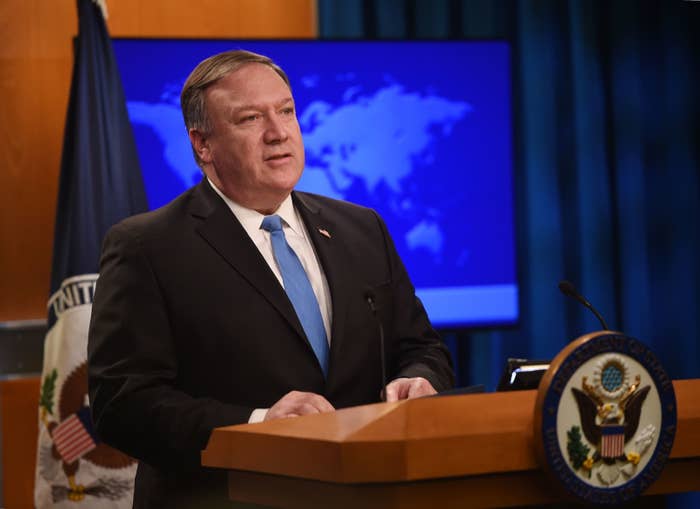
The Trump administration sent another signal on Thursday that it is stepping up its efforts against Iran, announcing the creation of an Iran Action Group at the State Department to coordinate US government actions against the Islamic Republic.
“We must see major changes in Iran’s behavior,” Secretary of State Mike Pompeo said, describing the new group’s responsibility as driving “daily progress on these objectives” and working to “change the Iranian regime’s behavior.”
A senior State Department staffer, Brian Hook, who until now was director of policy planning, will lead the group as the administration's new special representative on Iran.
Hook said the Iran Action Group will work to coordinate strategy within the State Department and across the government. Hook also said the group will focus on “nukes, terrorism, and the detention of American citizens.”
Some analysts tracking US policy see the group as offering a continuation of what the administration is already doing.
“Same policy, same demands and same dim prospects of achieving them," Barbara Slavin, an Iran expert at the Atlantic Council, told BuzzFeed News in an email. “Same policy of maximum pressure and same challenges to getting other countries on board. No prospect of talks.”
Others saw the move as another step toward a more aggressive US posture.
Mark Dubowitz, a sanctions expert and prominent Iran hawk who has advised the Trump administration, said the move reflected the kind of focus President Ronald Reagan and his team, including former CIA director William J. Casey, once turned on the Soviet Union. “This is what Secretary Pompeo is doing here,” Dubowitz told BuzzFeed News. “It’s a highly empowered action group led by one of Pompeo’s most trusted advisers leveraging all of the US government’s vast interagency resources to wage aggressive campaigns against the regime in Iran.”
Dubowitz, who heads the Foundation for Defense of Democracies, said the Iranian regime was counting on “a distracted Trump administration to lose focus on Iran.”
“They will be sorely disappointed,” he said.
Pompeo initiated a similar move in his prior post under Trump as director of the Central Intelligence Agency, overseeing the establishment of an Iran Mission Center to help coordinate the agency’s efforts. Last month, in a speech at the Ronald Reagan Presidential Library in California, he pledged support for Iranian opposition groups and described the US as “undertaking a diplomatic and financial pressure campaign to cut off the funds that the regime uses to enrich itself and support death and destruction.”
After Pompeo’s announcement on Thursday, Ali Vaez, the Iran project director at the International Crisis Group, summoned the specter of the George W. Bush administration’s march to war in Iraq. “This has eerie echoes of the White House Iraq Group in the run-up to the Iraq war and [is] another step towards groupthink in this administration,” he said, referencing the arm of the Bush administration that helped make the case for war.
“If the Trump administration was serious about diplomacy with Iran, it would have tapped someone as special envoy who had some constructive history with the Iranians, not a man who in the past 18 months presided over the destruction of all channels of communication and the only diplomatic achievement between the two countries,” he added.
US officials have stated that the Trump administration is not pursuing a policy of regime change in Iran but is instead working to pressure Tehran into changing its behavior.
At a press conference on Thursday, Hook said his new group will launch with a core staff of several permanent personnel. He added that “we have very good discussions with allies around the world” on the Iran issue.
The United States has threatened to sanction countries if they do not comply with US demands to cut Iranian crude imports to zero by Nov. 4 of this year. Hook reiterated that the United States is prepared to implement secondary sanctions on those countries that continue to trade with Iran.
Hook, a longtime Republican foreign policy operative, said the group would work to galvanize global support for the new US strategy on Iran.
“The president decided to leave the Iran deal because it was a bad deal,” Hook said, referring to the deal the United States and five other world powers reached with Iran to curtail its nuclear program. “The deal did not address the broad range of Iranian threats. We have a lot more diplomatic freedom” now, he added.
There was little immediate reaction from the countries that are still signatories of the Iran nuclear deal.
“I don’t think you can expect any official French reaction on the topic,” a French diplomat wrote in an email. “But you know our approach regarding the [deal], and it remains unchanged.”


